About Our Patient Education and Services
Shane Retina is a vitreoretinal medical and surgical practice. Our retinal associates are committed to improving the retina and macular degeneration knowledge and overall retinal health of our community. Dr. Shane and our staff are committed to bringing the most modern and effective methods to treating any retinal condition.
Our Retina Associates offer a variety of retina and macular degeneration treatments for these conditions:
Click on a link below to jump to that section.
- Macular Degeneration
- Diabetic Retinopathy
- Floaters and Flashes
- Retinal Detachment/Tear
- Dislocated Intraocular Lens
- Macular Edema
- Macular Holes
- Macular Pucker / Epiretinal Membrane (ERM)
- Retinal Vein Occlusion (RVO)
- Retinal Artery Occlusion (RAO)
- Surgical Services
- Imaging Services
- Additional Resources
Macular degeneration is the most common cause of blindness in patients over 65. Risk factors for central vision loss include smoking and family history. Treatment can greatly reduce the risk for blindness from AMD.
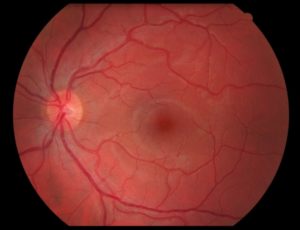 Diabetes causes blood vessel damage in the retina over time. As diabetic retinopathy progresses, blood flow to the retina is reduced, swelling distorts the central vision, and bleeding in the eye may block the vision altogether. In addition to blood sugar control, eye injections and the laser will help to slow and reverse vision loss.
Diabetes causes blood vessel damage in the retina over time. As diabetic retinopathy progresses, blood flow to the retina is reduced, swelling distorts the central vision, and bleeding in the eye may block the vision altogether. In addition to blood sugar control, eye injections and the laser will help to slow and reverse vision loss.
New floaters and flashes are a common and potentially dangerous development that may indicate that a retinal tear or detachment has occurred. A dilated eye exam is important for anyone newly experiencing these symptoms. Patients experiencing chronic, distracting floaters have options for removing them, including painless laser and surgical procedures.
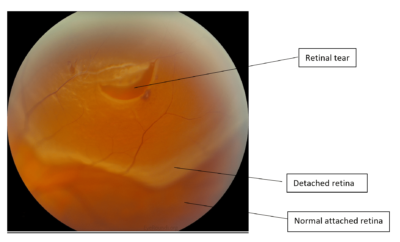 Sudden onset of floaters or vision loss in one eye can be a scary experience. Retinal tears and detachments can suddenly happen to anyone and require timely diagnosis and management with a retina specialist. Treatment options for retinal tears or detachments include laser or surgery.
Sudden onset of floaters or vision loss in one eye can be a scary experience. Retinal tears and detachments can suddenly happen to anyone and require timely diagnosis and management with a retina specialist. Treatment options for retinal tears or detachments include laser or surgery.
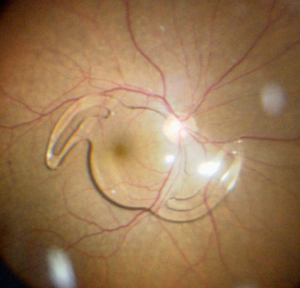 Occasionally, a cataract lens implant shifts or dislocates from its intended position in the eye. When this occurs, a patient may experience glare, a ghost image, or sudden blurriness in one eye. There are many options for restoring vision after an intraocular lens implant becomes dislocated, typically requiring surgery to restore the lens position behind the pupil.
Occasionally, a cataract lens implant shifts or dislocates from its intended position in the eye. When this occurs, a patient may experience glare, a ghost image, or sudden blurriness in one eye. There are many options for restoring vision after an intraocular lens implant becomes dislocated, typically requiring surgery to restore the lens position behind the pupil.
Swelling of the central retina is called macular edema. There are many causes for macular edema, including cataract surgery and inflammation in the eye (uveitis). Through careful history, dilated examination, and testing, a retina specialist can determine the appropriate cause and treatment for macular edema, which may include drops or eye injections.
Do you have a painless blind spot or distortion in the central vision of one eye? A dilated eye exam with specialized retinal imaging may reveal a macular hole. This spontaneous development often requires surgery to close the hole and restore central vision.
An epiretinal membrane is a common eye condition affecting patients over the age of 50. It occurs when a layer of scar tissue forms spontaneously in the center of the retina, causing wrinkles in the normally smooth macular surface. Patients experiencing a significant distortion in their central vision can be cured with surgical membrane peeling by an ophthalmologist fellowship-trained in vitreoretinal surgery.
Blood flow to the eye is supplied by a network of arteries and veins. Sometimes due to cardiovascular changes, a retinal vein can develop a blockage, causing blood to back up and spill into the retina. This ‘occlusion’ leads to chronic swelling and blurriness in the center of the vision. With eye injection treatment, most vision loss from retinal vein occlusion can be reversed.
When a blockage of blood flow occurs in a retinal artery, the vision downstream of the blockage is immediately lost. Causes for retinal artery occlusion include an embolus from the heart or carotid arteries and inflammation in the retinal vessels. This is a medical emergency, as it can lead to permanent blindness or stroke in the brain.
Patient Testimonial
A wonderful experience from beginning to end! All of the employees I contacted were so nice and Dr. Shane could not have been more professional in his exam and explanations. Actually, “professional” is a great way to describe the whole office. I am an accountant who sells nothing but service so I know good service when I contact it and this was great. 5 stars – I’d give more stars if I could.
Surgical Services by Retina Associates
Sometimes, retinal and macular degeneration conditions are severe enough that surgery may be necessary. In these cases, there are few doctors more qualified to operate than Dr. Shane.
Surgical procedures available at Shane Retina include:
The thought of an injection in the eye can be scary, but this procedure is critical in the fight against blinding retinal conditions such as macular degeneration, diabetic retinopathy, and retinal vein occlusion. Thanks to antibacterial and anesthetic drops, eye injections are one of the safest and most effective ways to prevent blindness.
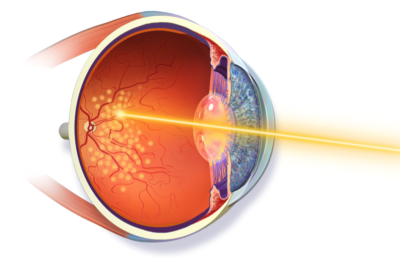 Retinal laser is a non-invasive clinical procedure that is effective in the treatment of retinal tears, retinal detachments, and diabetic retinopathy.
Retinal laser is a non-invasive clinical procedure that is effective in the treatment of retinal tears, retinal detachments, and diabetic retinopathy.
Cataract surgery is one of the safest and most effective surgeries in America. However, occasionally some pieces of the cataract fall into the back of the eye and must be retrieved by a retinal surgeon using a vitrectomy.
A mainstay of retinal surgery, vitrectomy involves the removal of the vitreous jelly that fills the eye. Vitrectomy allows retinal surgeons to directly manipulate the retina and other inner eye structures to treat retinal detachments, epiretinal membranes, macular holes, dislocated lens implants, and floaters. Vitrectomy is done painlessly through tiny incisions under local anesthesia in an outpatient surgery center.
Scleral buckling is one of the original and most effective methods for repairing a retinal detachment. The surgery involves the placement of a silicone band around the equator of the eye, essentially squeezing the eyewall towards the detached retina. Advantages of a scleral buckle include avoidance of cataracts and enhanced protection from re-detachment.
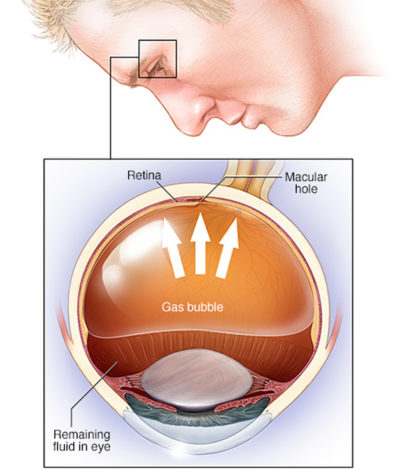 Many retinal detachments can be effectively treated in the clinic using a gas bubble injected into the eye, a procedure called pneumatic retinopexy. After the bubble flattens the retinal detachment, laser or freezing treatment is applied to permanently seal the underlying retinal tear. Patients who undergo successful pneumatic retinopexy frequently achieve faster recovery of vision and better visual outcomes than those who undergo surgical repair.
Many retinal detachments can be effectively treated in the clinic using a gas bubble injected into the eye, a procedure called pneumatic retinopexy. After the bubble flattens the retinal detachment, laser or freezing treatment is applied to permanently seal the underlying retinal tear. Patients who undergo successful pneumatic retinopexy frequently achieve faster recovery of vision and better visual outcomes than those who undergo surgical repair.
Fluorescein angiography is a series of real-time photographs of fluorescein dye as it circulates through the blood vessels in your retina. This test can highlight abnormalities in the blood vessels of the retina, which can occur in several retinal diseases, including age-related macular degeneration, diabetic retinopathy, and retinal vein occlusion.
Occasionally, a cataract lens implant shifts or dislocates out of position. In this situation, suturing a new lens implant into the eye is the best way to restore vision and normal eye anatomy.
*Some retinal procedures (intravitreal injection and retinal laser) are performed in the office at the time of your exam. Outpatient surgery is conducted at the Bayview Surgery Center, Surgery Center at St. Andrews, or at Manatee or Sarasota Memorial Hospital.
Surgery Patient Testimonial
I am a 68 year old, active type guy. I suffered a detached retina in a bad bicycle wreck. I needed emergency retinal surgery and was referred to Dr. Shane. His office was closed that day, but he agreed to meet me and evaluate the situation. He was kind and compassionate to my situation and Dr. Shane performed retinal surgery within an hour after we met. The surgery went very well and painlessly. My eye was 20/20 before the wreck and I hoped to have 20/50 or so afterward….but my eye is once again 20/20 after surgery. Dr. Shane is a VERY skilled surgeon. His office and staff have been first rate during the followups. I would wholeheartedly recommend Dr. Shane for any retina issues. I believe he performed a near miracle on me! 20/20 and happy!
Imaging services available at Shane Retina include:
Optical Coherence Tomography (OCT) uses infrared light to image the central part of the retina called the macula. These images represent a virtual cross-section of the retina, allowing the ophthalmologist to see microscopic details of the macula. OCT is useful for diagnosing, treating, and following several retinal diseases, including age-related macular degeneration, diabetic retinopathy, retinal vein occlusion, and macular holes and macular pucker.
Ocular ultrasound is a non-invasive test that uses ultrasound waves to create an image of the structures inside the eye. It is useful in cases where there your ophthalmologist does not have a clear view of the retina. (such as with a dense cataract or hemorrhage in the eye). In addition, ocular ultrasound allows for the diagnosis and measurement of any structures or masses within the eye.
A macular pucker and macular hole result from fine membranes causing traction on the surface of the retina. By removing these membranes with microscopic instruments, a retinal surgeon can reverse the retinal tension and restore lost vision.
Retinal photography may be helpful in the diagnosis, treatment, and follow-up of retinal conditions, such as choroidal nevus (eye freckle) and age-related macular degeneration.
If you or a loved one are experiencing changes to your vision, we recommend talking with a professional immediately so that it doesn’t get worse. Please call us today at (941) 351-1200. We can help you!
Additional Education from Shane Retina
Here are some more retina articles by Dr. Shane that you can read to learn more about age-related macular degeneration and other retinal conditions.
If you have any questions or would like to schedule an appointment in Sarasota, FL, contact us today!
Dr. Shane is committed to bringing the most modern and effective methods to treating any retinal condition.
